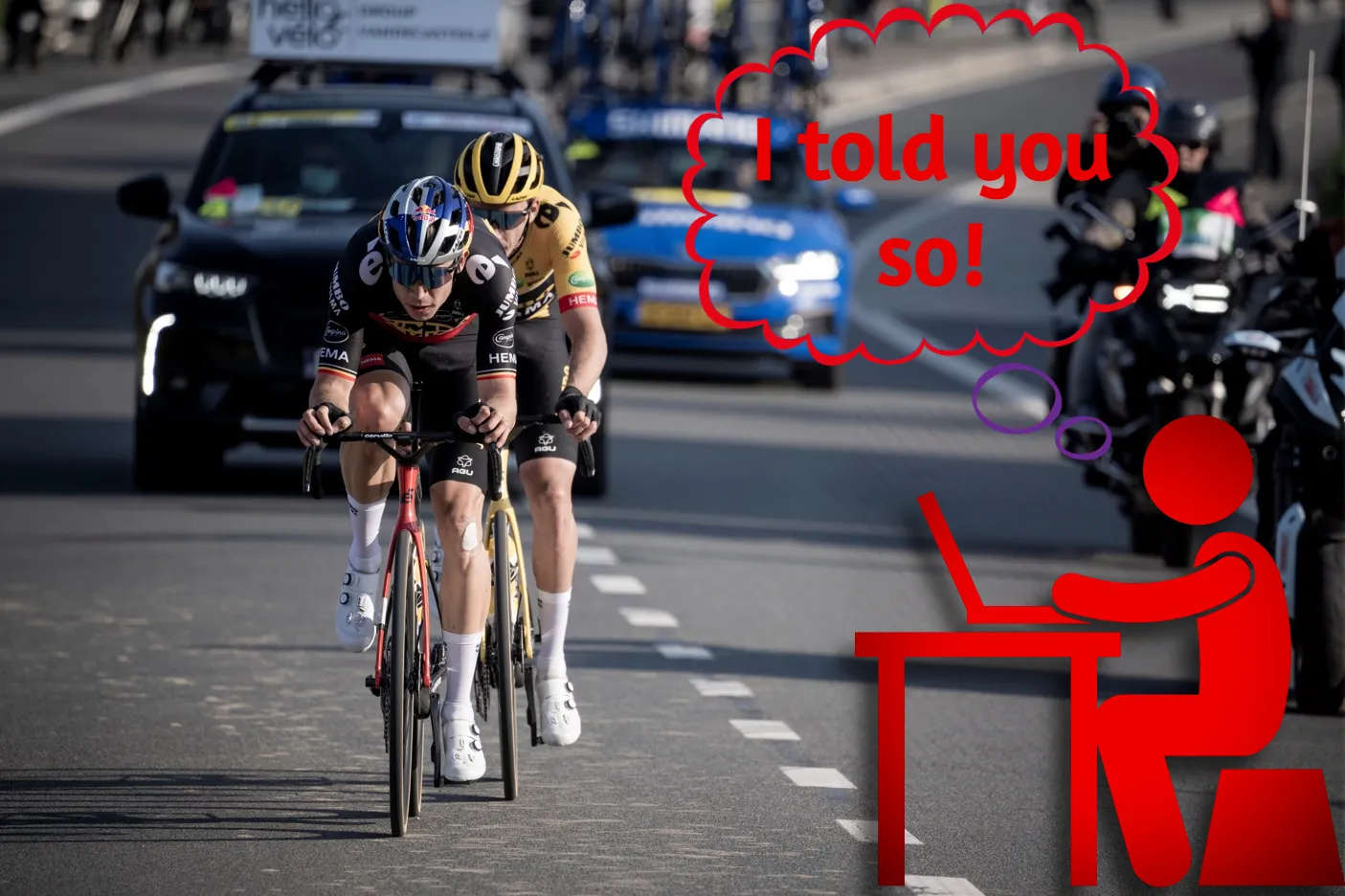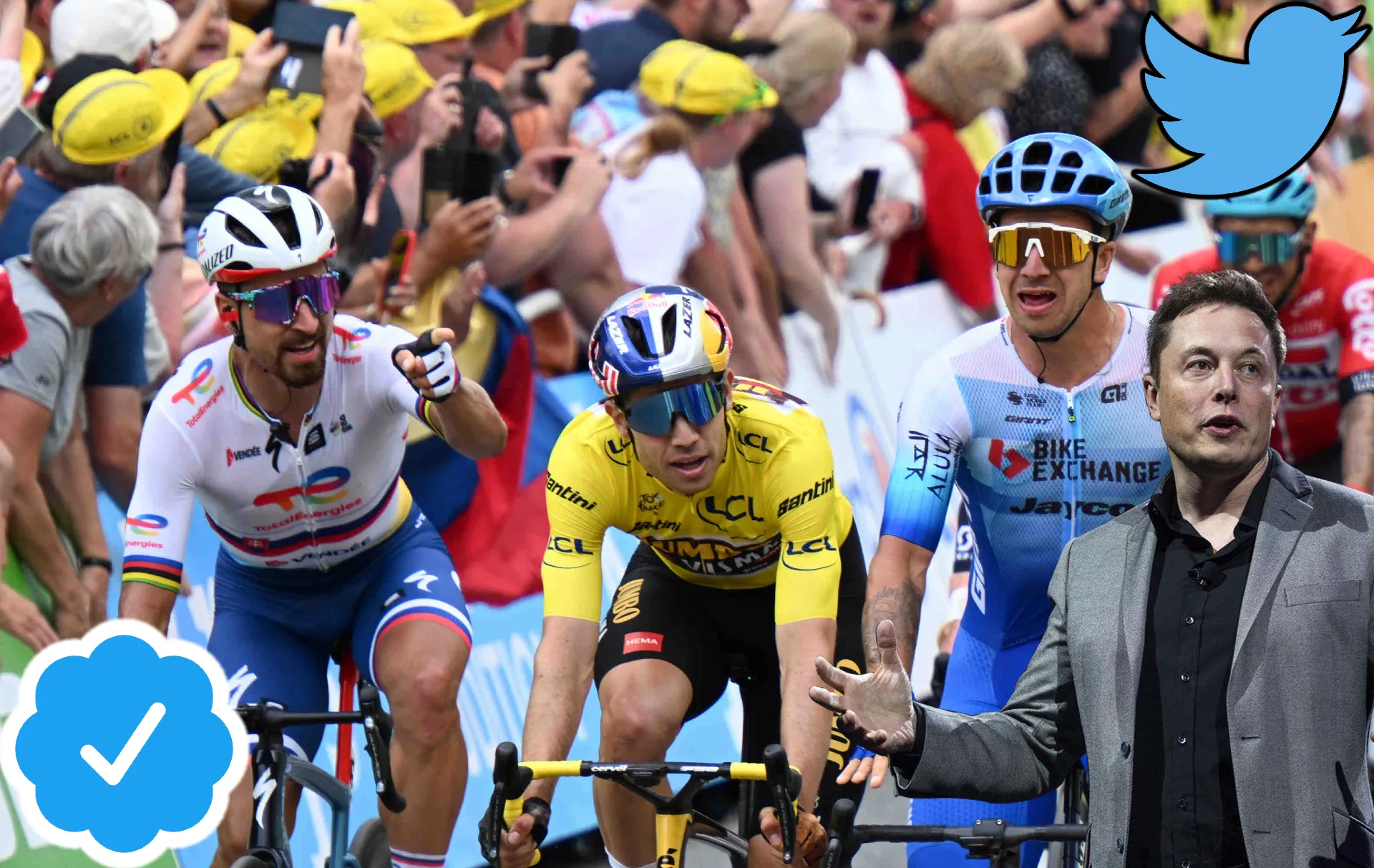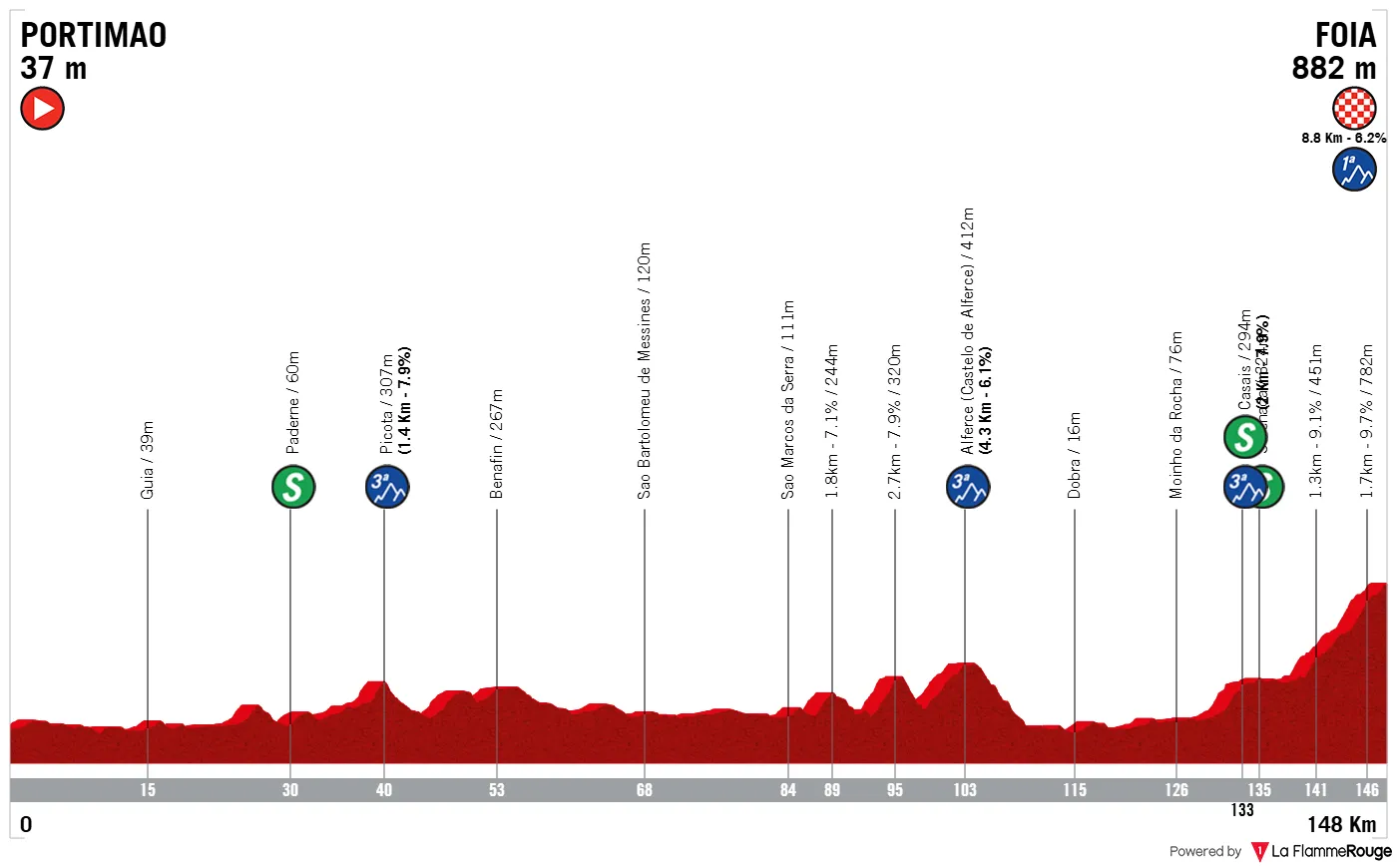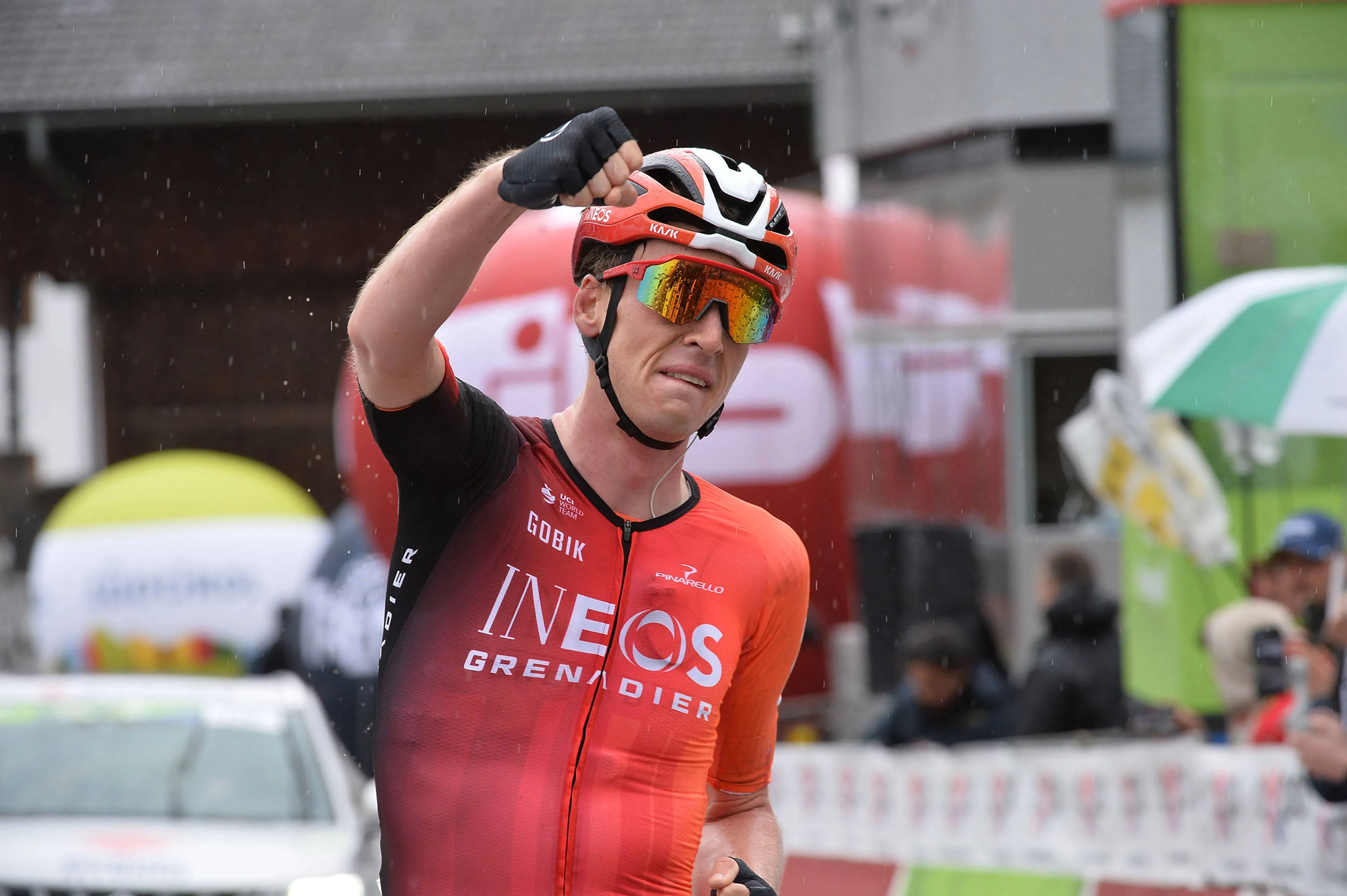INTERVIEW | Raúl Banqueri, the mastermind behind the UCI points and 2022 relegation battle
CyclingFriday, 23 December 2022 at 15:33
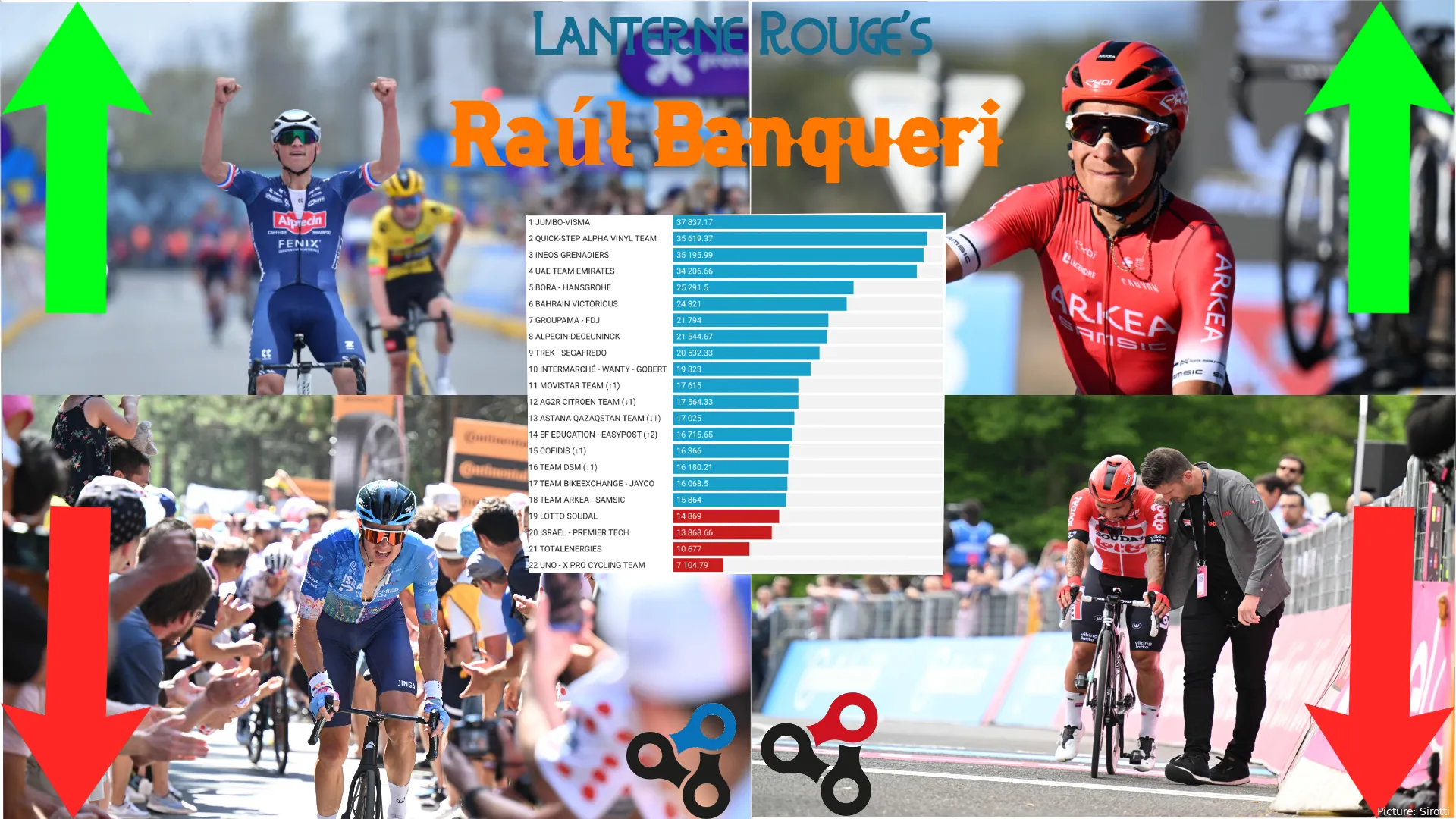
2022 was a year of many things in the cycling world, however one that was not expected by many was the story that would develop over the year regarding the relegation battle. Lotto Soudal and Israel - Premier Tech were relegated from the World Tour after scoring less points that Alpecin-Deceuninck and Arkéa Samsic through 2020 to 2022, and there was one man that kept everyone from fans to team managers up to date on the points: Raúl Banqueri.
"I started to pull this thing of the ranking because Movistar was in very in a very bad situation," Banqueri shared in an interview with CyclingUpToDate and Ciclismoaldia. "Nobody knew about this ranking these things on the relegation battle, but if they see Movistar in red stone, it’s like dying, everybody joked about the team." This was back in 2021 when all teams were already inside the 2020-2022 triennium and it was known that the 18 teams that would score the most UCI points would be given a UCI license from 2023-2025.
Read also
Not many people who kept up with cycling however were aware of this situation. The system worked in a way that the 18 teams from the World Tour and ProTeam divisions to score the most UCI points in these three seasons added up would be awarded in the next triennium. These points are awarded via results in the races, with each race category having it's own points system. It was a system set to encourage teams to perform and be competitive, that would also allow teams from the second division to be promoted to World Tour level on the basis of their performance.
Three ProTeams stood out throughout these three years: Alpecin-Deceuninck, Arkéa Samsic and TotalEnergies. Having headliners such as Mathieu van der Poel, Nairo Quintana and Peter Sagan, all three of these teams found themselves at a very similar - or even higher - then some World Tour teams, scoring more points than those above them, causing a battle to erupt in 2022 as there were only 18 positions for 20 teams that were directly involved in the battle for promotion - whilst TotalEnergies was a bit below, but directly involved in the battle for the wildcards, which will be discussed.
Read also
Banqueri is a data journalist and in 2021 he decided to focus on this battle. "There was a good opportunity to deepen this because the ranking was sacred and nobody knew about the ranking and there was like a vacuum in this," he explained. In 2022 he was hired by Lanterne Rouge Media which provided him with the opportunity to dedicate more time and resources into creating his own database with all the scoring systems, different races, up-to-date rankings and everything regarding the battle that was taking place on the road.
"I started in 2021 to just copy paste official rankings and make our graphic chart, but the UCI makes a lot of errors or sometimes mistakes too," he says, referring to delays and sanctions. "So in 2022
with the economical support of Patrick (Lanterne Rouge, ed.), I decided to create my database, It's
an Excel file and I have registered an index that tells all the points."
"I was able to
pull is the ranking every day, that was very interesting because the UCI only
have these rankings on Tuesdays. For example when the situation was
critical some months ago, teams wanted
to look at the classification, their ranking every day after every race. And I
had the ranking updated after every race. So it was nice to have to have interest
and I was able to pull more data about the ranking thanks to having my database. If not it would
be impossible."
These frequent updates became a big part of Raúl's work, and has seen him rise in popularity over social media. Not only that, but his work has for most people became more reliable than the UCI's, and he shared that not only teams kept up with his specific work, but pro riders would also talk to him to learn more about the system. As the season progressed the UCI rankings' updates became more and more important as several teams found themselves in the battle to maintain their position in the World Tour.
More specifically, Lotto Soudal and Israel - Premier Tech were below the red line throughout virtually the entire season, as Alpecin-Deceuninck comfortably placed themselves near the top of the charts, and Arkéa Samsic scored a hefty heap of points throughout the three years. Movistar Team, Cofidis, EF Education-EasyPost, Team BikeExchange - Jayco and Team DSM. DSM, alongside Astana Qazaqstan Team, were the World Tour teams that scored the fewest points in 2022, but previous seasons saw them start with enough lead to be comfortable throughout the year.
In the end, Lotto Soudal and Israel - Premier Tech went down. Although the gap was at points very narrow, it extended in the final months of the season. "Lotto Soudal, in the pre-season of last year, they continued to say that they had no fear. They said that they would have the points without hunting points. And yeah the problem is every team had riders they are not competing alone... Lelangue was very irresponsible," he commented on the Belgian team.
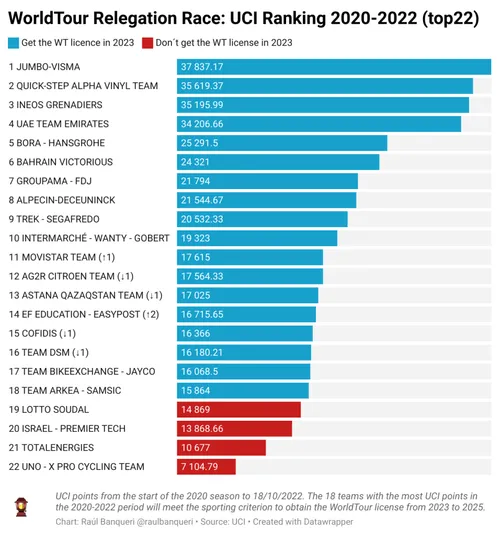
2020-2022 final UCI rankings. Via Raúl Banqueri/Lanterne Rouge
As for Israel - Premier Tech, he was a bit more surprised on the relegation: "I thought that they wouldn’t have problems because they had Michael Woods, [Jakob] Fuglsang, [Giacomo] Nizzolo, [Sep] Vanmarcke. they had a lot of good riders but I don't know, the management was horrible." To this day Sylvan Adams is threatening to sue the UCI over the imminent relegation, whilst Lotto Soudal CEO John Lelangue quit the team several months ago.
On the bright side he brings examples such as Movistar Team and Arkéa Samsic. "In something like Arkéa or Movistar the situation, that the pressure became a positive because they were more motivated and that they wanted to solve the situation but in Lotto Soudal and Israel it was the opposite," also giving the example that "in Israel
all the riders in the Italian Classics were out of shape. Michael
Woods was a DNF every race and Fuglsang
the same (all but Il Lombardia where he finished 71st, ed.)? Yeah, was terrible."
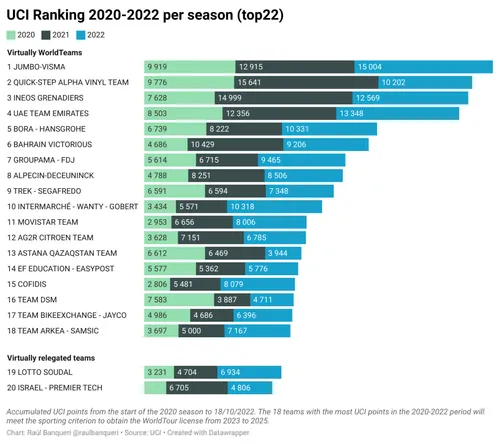
2020-2022 UCI points by season. Via Raúl Banqueri/Lanterne Rouge
On the opposite side of the spectrum, the promotion of Alpecin-Deceuninck and Arkéa Samsic to World Tour level will make for a different structure next year in the top division. "They knew
the system very well, they were conscious," he said of the French team. "They knew the tactics of the team,
it was the key of success. Even without Nairo Quintana’s points from the Tour,
they were able to finish in the top 18." As for Alpecin Banqueri was unsurprised due to the presence of the likes of Mathieu van der Poel, Jasper Philipsen and Tim Merlier who helped the team into 8th position in the triennium.
Will the same battle repeat itself in the coming years? "In 2025 the
last year of the triennium we could have a similar situation that that of this year," he believes. "I think that they are thinking in the ranking from the start, but they are going to plan for the (three, ed.) seasons, maybe Movistar at some classics or Education First at some classics to get points, but it won't be as crazy as this year. So they will plan it with more time now in the pre-season so they won't attend so many races [in 2025].
With Lotto Soudal, Israel - Premier Tech, TotalEnergies and the Uno-X Pro Cycling Team seeking World Tour status it will be a tight battle for the current teams to maintain their spot, specially as the ProTeams continue to bring stronger and stronger leaders. The transfer of Alexander Kristoff, the 9th biggest point scorer this year, to the Norwegian team is a big sign of that.
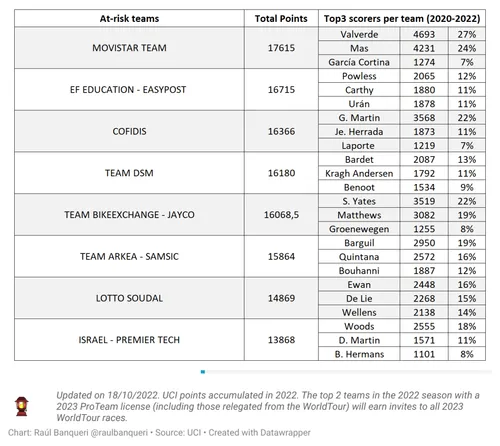
Percentage of points scored by team leaders from 2020-2022. Via Raúl Banqueri/Lanterne Rouge
However it isn't only the teams towards the bottom that eye the rankings. Although the likes of Jumbo-Visma, UAE Team Emirates, INEOS Grenadiers or Quick-Step Alpha VInyl Team don't focus on the three-year rankings, there are intentions behind the yearly ranking. "It’s not
very prestigious but for example, [Joxean] Matxin of UAE wanted to be the best team of
the world and to win the yearly ranking
this year. And he will want it also next year... And they race a lot of minor race with [Matteo] Trentin, [Diego] Ulissi, and that type of rider to win points. Also INEOS, they are pursuing
this goal to become the best team of the world. "
The biggest question however when it comes to how fans react to the rankings' system is it's current state. "I like the
system because with 3 years of ranking it’s more or less fair," Banqueri answered. "Although some teams have been struggling with
injuries but in a three-year period there is time for everybody to recover. Yeah, I
think it has been a success but I don't know a lot of fans say that every time
seeing the points we have missed the focus in the sport but I understand all the reasons
and all the takes."
More controversial are the points distributed in different races. Whilst a victory at the Tour de France earned 120 points, an 8th place in a race such as the GP de Montréal, or victory at a 1.1 race would earn 125 points. Many, including riders and team managers criticized the system over imbalances like this. Furthermore as many as eight teams were forced to change their initial plans and calendar so as to find a more effective way to gather points, which frequently also included more conservative tactics as teams looked to have several riders able to score.
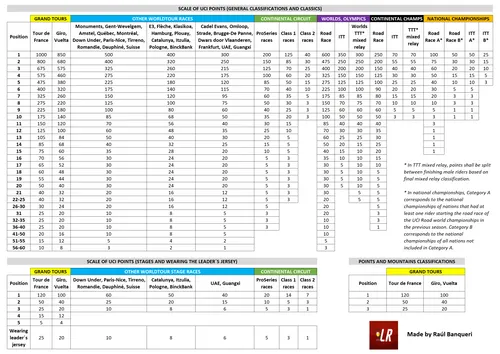
Complete points distribution. Via Raúl Banqueri/Lanterne Rouge
"For
example, Circuito de Getxo gives more points than a stage in the Tour de
France. But yeah, more more or less, they
have to favour points in stage-races. If you are fourth in a Paris-Nice stage
you have zero points, it's not fair. But I
wouldn't change all the systems, so I would do some things," he responded.
Banqueri also brought up the obvious case of the continental championship points, where the likes of the Oceania and Africa Continental Championships brought in as many points as the Europeans despite having more modest startlists and few riders actually focusing on those races. A win in any of these races would be worth more than two Tour de France stage wins - 250 points, to be exact.
Lotto Soudal famously signed Reinardt Janse van Rensburg following his success in the South African nationals and African continentals where he scored 343 points. However these were not added to the Belgian team's tally as he did not race under their colours. Besides, only the points from the team's ten best scoring riders would be counted, further bringing in criticism from those involved.
"So yeah,
the UCI have to change it before the season starts. Because you can't change the rules in the
middle of the game. Now is a good opportunity to change some points, and I think they have been discussing
this in the World Tour seminar that has been called the last week," he concluded.
You can keep up with Raúl's work by clicking here, and you can follow him on Twitter where he shares his data and opinions. As the battles for the UCI points continue in the coming years, his work will remain important for teams and fans to be informed.
claps 1visitors 1
Just in
Popular news
Latest comments
- As per a great many on the world stage...you must be beside yourself amongst them all!
 leedorney19-02-2026
leedorney19-02-2026 - Well, you might be right because the overlap is really quite small even though the individual audiences might be more significant. BUT if you’re trying to say there’s little chance anyone not totally aligned with these characters’ life choices is going to sponsor their ventures, yes, totally agree.Mistermaumau19-02-2026
- I'm not
 leedorney19-02-2026
leedorney19-02-2026 - And the Europeans - Manolo Saiz Once team manager, the Festina team, do you want me to go on.. ?
 leedorney19-02-2026
leedorney19-02-2026 - It's sad that Lance/Johan has had to tolerate this all these yrs, they should be admired imo - all they did was organise a brilliant system better than the Europeans FACT, again who wasn't on anything back then properly - everyone, reportedly.. yet the fact is who actually knows, pro cycling and pro sport in general will never shake the doper aspect fully
 leedorney19-02-2026
leedorney19-02-2026 - Even less chance of getting me to watch that than Melania which my other half would maybe twist my arm into watching if she wanted to fall asleep without brain activity.Mistermaumau19-02-2026
- What total BS You were both dictating the narrative for the more than 10 years before you had to change it. You had PLENTY of time to tell your story or correct others who got it wrong, you only « corrected » them when they were getting it ki d of right. AND, you wouldn’t be asking to tell anything now if things had stood the way they were. The ONLY thing you regret is getting caught, just like all those now part of the Epstein collateral. Cheap-lay (that’s my Clavicularistic replacement for a four lettered F-word).Mistermaumau19-02-2026
- Imagine Pogi being in this race. He would motivate Del Toro "common, common...let's go, let's leave Remco even more behind." Of course Pogi would go ahead and catch Tiberi. 1) Pogi... 2) Tiberi... 3) Del Toro... Remco would be behind more than 3 min. Pogi being at the UAE (his own Tour) would have crushed Remco mentally, like in 2025. Poor little Belgian child.Mou-Cro-HR19-02-2026
- Slowly and slowly Remco is fading. He's an over rated cyclist.Mou-Cro-HR19-02-2026
- Go back a few months and check what I wrote. This guy is the best sprinter out there in the next 5 years. Also he can do more than sprint ..
 PAULO19-02-2026
PAULO19-02-2026
Loading
The collapse of B&B leaves very few options for the future of its riders and even complicates the future of Nairo Quintana. In the article, I analyse the slots available in each WorldTeam and how the number of neo-professionals influences the maximum limit of cyclists per team.
Write a comment
